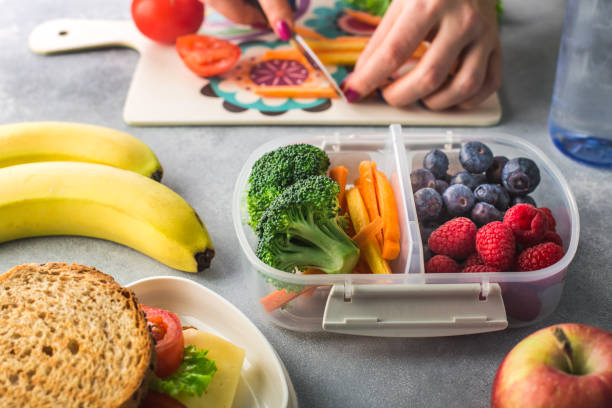
Proper nutrition is vital for a child’s physical and mental development. These essential tips ensure your child gets the best foundation for a healthy life.
Include a Balanced Diet Daily
Children need a mix of protein, carbohydrates, fats, vitamins, and minerals. Each meal should include:
- Whole grains (brown rice, oats, whole wheat bread)
- Lean proteins (chicken, eggs, beans)
- Healthy fats (avocados, olive oil, nuts)
- Fresh fruits and vegetables
Balanced meals support strong bones, boost energy, and help brain development.
Don’t Skip Breakfast
Breakfast is the most important meal of the day for kids. It fuels concentration and performance at school.
Great breakfast options:
- Whole grain cereal with milk and fruit
- Peanut butter toast with a banana
- Yogurt with granola and berries
Avoid sugary cereals or pastries that cause an energy crash.
Stay Hydrated with Water
Children often forget to drink water. Encourage them to stay hydrated by making water fun:
- Add lemon or mint for flavor
- Use colorful, child-friendly water bottles
- Set reminders or create a “drink water” game
Limit sodas and sugary drinks to prevent obesity and tooth decay.
Prioritize Iron and Calcium
Iron helps build healthy blood. Calcium builds strong bones. Growing kids need both.
Iron-rich foods:
- Spinach
- Red meat
- Lentils
- Iron-fortified cereals
Calcium sources:
- Milk and dairy
- Leafy greens
- Almonds
- Fortified orange juice
Pair iron with vitamin C (like orange juice) to improve absorption.
Limit Processed and Sugary Foods
Highly processed snacks and sugary treats provide empty calories. They may lead to poor digestion, mood swings, or obesity.
Instead of chips or candy, offer:
- Fresh fruit slices
- Yogurt with honey
- Nuts and seeds
- Homemade trail mix
Healthy alternatives keep energy levels stable and improve mood.
Encourage Family Meals
Eating together teaches children about healthy food choices. It also strengthens emotional bonds.
During meals:
- Turn off screens
- Involve kids in cooking
- Talk about their day
When children see adults making healthy choices, they often follow.
Make Fruits and Vegetables Exciting
Kids are more likely to eat colorful, fun-looking foods. Try:
- Fruit skewers
- Veggie faces on toast
- Smoothie bowls with toppings
Let them help in prepping — they’ll enjoy eating what they make.
Keep Portion Sizes Appropriate
Children don’t need adult-sized portions. Overfeeding can lead to weight issues. Use smaller plates and let them ask for seconds if still hungry.
Signs they’re full:
- Slowing down eating
- Playing with food
- Saying they’re not hungry
Respect their hunger cues to build lifelong healthy habits.
Plan Healthy Snacks
Children often need 1–2 snacks between meals. Choose nutrient-rich options:
- Boiled eggs
- Apple slices with peanut butter
- Hummus with carrot sticks
- Cheese cubes with whole grain crackers
Avoid snacks close to mealtimes to maintain appetite.
Ensure Proper Vitamin D
Vitamin D supports immunity and bone health. Get it through:
- Safe sun exposure (15–30 minutes a day)
- Fortified foods (milk, cereals)
- Supplements if needed (as per pediatrician advice)
Vitamin D deficiency can lead to weak bones and fatigue.
Set a Routine
A consistent eating schedule helps regulate metabolism. Serve meals and snacks at the same time daily. Avoid late-night eating or skipping meals.
Routine builds discipline and better digestion.
Monitor Growth and Adjust Diet
Track your child’s height and weight regularly. Adjust their diet if needed:
- Growth spurts may require more calories
- Illness may call for immune-boosting foods
- Underweight or overweight signs need professional input
Consult your pediatrician for a customized nutrition plan if unsure.
Final Thoughts
Raising healthy children starts with smart, daily nutrition choices. A mix of love, variety, balance, and routine makes all the difference. Your child’s future health depends on the habits you build today.





Thanks for every other excellent post. Where else may anybody get that kind of information in such a perfect approach of writing? I have a presentation next week, and I’m at the search for such information.
Thank you for sharing superb informations. Your website is very cool. I’m impressed by the details that you have on this blog. It reveals how nicely you perceive this subject. Bookmarked this web page, will come back for extra articles. You, my friend, ROCK! I found simply the information I already searched all over the place and just couldn’t come across. What a great site.
I really appreciate this post. I?¦ve been looking all over for this! Thank goodness I found it on Bing. You’ve made my day! Thanks again
Great blog here! Additionally your website loads up fast! What host are you using? Can I get your affiliate hyperlink for your host? I wish my site loaded up as quickly as yours lol
I like this web blog very much, Its a very nice billet to read and incur info .
Yeah bookmaking this wasn’t a risky decision great post! .
Have you ever thought about writing an e-book or guest authoring on other websites? I have a blog based on the same information you discuss and would love to have you share some stories/information. I know my subscribers would appreciate your work. If you’re even remotely interested, feel free to send me an e mail.
I am glad to be one of several visitants on this outstanding website (:, appreciate it for putting up.
Really fantastic information can be found on website.